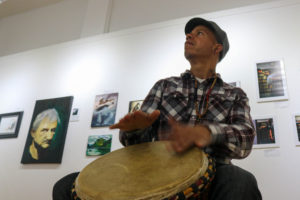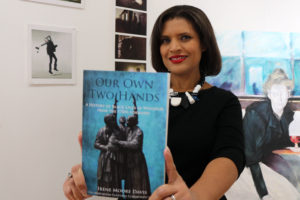Hidden histories: Exploring the real stories of Windsor’s African, Caribbean communities

Taejai Travis uses music, poetry and other forms of art to tell the stories of his family history. (Photo by Ryan Percy)
Teajai Travis wasn’t sat down as a child and told stories of his family history — instead, he picked up information from his grandmother by listening to her sing.
“A lot of the stories a grandmother would pass down to her grandchildren I did not get in a direct way,” Travis said. “It was more abstract. Listening to things she would say or sing as she would walk around the house and trying to piece together those stories.”
Travis was the only black man at Reclaiming Hidden Histories, held at the ArtSpeak Gallery in Walkerville. The event saw members of the community coming together to celebrate the untold stories of Windsor’s African and Caribbean community.
The artist discovered his love for history through his grandmother on his father’s side, a challenge due to her Alzheimer’s — but managed to trace his family tree back to the 1800s in Virginia.
“When I went to the Mercy County Historic Society in Pennsylvania, I was the first person to be in that location since my family left in the 1800s,” Travis said. “Had I not gone there I would not know about it. My family wouldn’t know. Who knows how many generations would have gone by before somebody made the connection.”
One of the key works of literature on Windsor’s black community is Charlotte Perry’s The Long Road. The book covers the stories of the African community in Windsor from 1867 until 1967.
Irene Moore Davis, the president of the Essex County Black Historical Research Society, is in the process of editing and publishing her own work entitled Our Own Two Hands focusing on communities of colour in Windsor from the 1700s onward. Moore Davis said her goal is to expand on the work Perry’s novel has already built.

Irene Moore Davis’s new book is set to release Spring 2020. (Photo by Ryan Percy)
“Perry took the limited resources which she had access at that time and really spun gold out of it and made a wonderful comprehensive history of black Windsor,” Moore Davis said. “But what was missing are the voices of a lot of the ordinary people who make up black Windsor.”
Davis said the goal of her new book is to put a light on people of colour in the community who are not just African-Canadians. She said particular focus was put on Caribbean-Canadians and Canadians who came directly from Africa.
Travis has been following a similar path with his own family tree research, trying to pin down the entire story and not just the extraordinary.
“It’s the kind of work I’ll probably be doing for the rest of my life,” Travis said. “Right now I am really working on the narrative of my oldest known ancestor but also trying to weave all the way through my family tree and make sure none of those stories go forgotten.”


